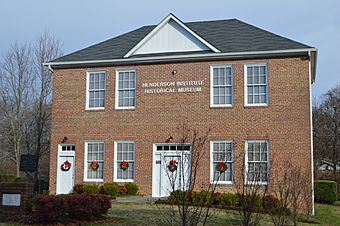Library and Laboratory Building-Henderson Institute facts for kids
Quick facts for kids |
|
|
Library and Laboratory Building-Henderson Institute
|
|

Front of the building
|
|
| Location | 629 W. Rock Spring St., Henderson, North Carolina |
|---|---|
| Area | less than one acre |
| Architectural style | Colonial Revival |
| NRHP reference No. | 95001399 |
| Added to NRHP | November 29, 1995 |
The Library and Laboratory Building-Henderson Institute is a special old school building located in Henderson, North Carolina. It was built in 1928. This two-story brick building has a design style called Colonial Revival.
This building is very important because it is the only part left of the original Henderson Institute. The Henderson Institute was a school started in 1887. It helped African-American students get a high school education. Today, the building is home to the Henderson Institute Historical Museum.
Contents
What is the Henderson Institute Building?
This historic building is made of brick and has two floors. Its design, called Colonial Revival, means it looks like buildings from early American history. It was finished in 1928.
Why Was Henderson Institute Important?
The Henderson Institute was founded in 1887. It was started by a group called the Freedmen's Mission Board of the United Presbyterian Church of North America. Their goal was to provide high school education for African-American students. This was very important during a time when many African-Americans did not have access to good schools. The institute helped many students get an education.
A Recognized Historic Place
The Library and Laboratory Building is recognized as a significant historical site. It was added to the National Register of Historic Places in 1995. This means it is officially recognized by the United States government as a place worth preserving because of its history and importance.
External Links
- Henderson Institute Historical Museum - official website
- Henderson Institute Graduates and Former Students Association, Inc. website
 | James B. Knighten |
 | Azellia White |
 | Willa Brown |



